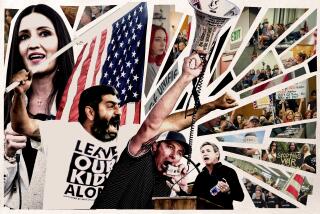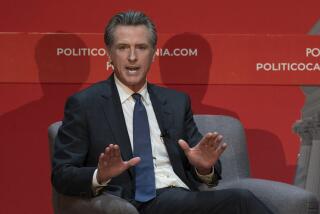Repeal of Adoption Ruling May Not Affect Gays : Families: Some activists question Gov. Wilson’s reversal of the guideline making it easier for unmarried couples to adopt. They say it’s the children who could be hurt.
- Share via
Nicholas Abbitt, 6, finally has two legally recognized parents, both of them women.
Gov. Pete Wilson’s decision last week to rescind a rule making it easier for unmarried couples to adopt had no effect on this Westside family, which consists of two professionals who have lived together for 22 years and little Nicholas. The boy has been with the lesbian couple since birth, but until last Wednesday he had only one legal parent, businesswoman Diane Abbitt, to whom he is related.
Her life partner, attorney Roberta Bennett, had already begun proceedings to adopt Nicholas when she learned about Wilson’s action. While Bennett understood that state law has never prohibited such adoptions, she worried that some judges might hurriedly read and misinterpret Wilson’s message. So she tried to “push the procedure through” as quickly as possible. Two days later, Nicholas became her legal son and heir.
The guideline under scrutiny is spelled out in a letter sent to adoption agencies in December by the state Department of Social Services. It said, in part: “Effective immediately . . . the department will no longer deny applications, withhold consent to an adoption petition, or recommend disapproval of an adoption petition based solely on the applicants’ or petitioners’ marital status.”
A spokeswoman for the governor said last week that neither he nor his advisers had approved such a change in the state adoption policy, which was written in 1987.
Bennett and other activists in the gay community say that Wilson’s move will probably have little effect on the increasing numbers of adoptions by gay men and lesbians. They can continue to adopt as single parents. But having only one legal parent unnecessarily leaves a child in peril, they say. What if the parent who adopted dies?
“Can you imagine the grief and horror” of a child, raised by two loving parents, who is removed to a foster home because the surviving parent has no legal status? Bennett asks.
And her worries don’t stop there. “I think this sends a clear message to gay and lesbian families that we are considered ‘less than’ by the governor--and that future family units could be in jeopardy,” she says.
Activist Jehan Agrama of Beverly Hills is the biological mother of a 6-month-old girl. Agrama’s partner of 14 years, Dwora Fried, hopes to become the baby’s legal parent by adoption.
“It’s essential we do this,” Agrama says. “If anything should happen to me, our child will still have one loving parent who is legally a parent. There are so many unwanted and unloved children in the world. The only ones who will suffer from Wilson’s guideline, if it is carried out, are the children. They could be removed from wonderful homes where they are secure and loved and wanted, and put into places where they are not.”
Shannon Bowman, spokeswoman for the California Health and Welfare Agency in Sacramento, which oversees the Department of Social Services, explains that while the state does not recommend adoption of children by unmarried couples under its 1987 policy, judges can and often do override the state recommendation.
For example, Bowman says, a social worker might investigate a couple and explain to the judge that they are excellent parent material in every respect--except they’re not married. The state would reluctantly recommend against the adoption, and the judge would overrule the recommendation.
“It is always the judge who ultimately decides,” Bowman says.
She says the American Civil Liberties Union had threatened a lawsuit because the 1987 policy was not backed by statute. The ACLU termed it “an underground regulation,” which had the effect of undermining adoption efforts by gays and lesbians, who cannot legally marry.
John Harrelson, 25, is delighted that a judge permitted his father to adopt him when he was 9. “My father was an excellent dad. He never hid the fact that he was gay, and it didn’t affect his parenting ability or his commitment as a parent. I went through a lot of abuse till I got to my dad,” says Harrelson, who owns a health food company in Riverside. “And then everything was fine.”
Virginia Uribe, founder and coordinator of Project 10, a Los Angeles dropout-prevention program for gay, lesbian and bisexual youths, says she is appalled by the governor’s decision.
“It seems to me that the placement of children in homes should have to do with the love and attention that parents can provide for the children.
“The bottom line should be love--and not sexual orientation. I have children and grandchildren of my own. And I know many gays and lesbians who are just wonderful parents. They have often provided loving homes for children who are considered difficult to place. . . . To prevent even one of those children from getting a good home is unthinkable.”
Says Andre Jacinto, executive vice president of the L.A.-based Gay and Lesbian Parent Coalition International: “ ‘Every child has a right to a permanent, continuous and nurturing relationship with a parent or parents who convey to the child an enduring sense of love and care.’
“That’s a statement straight from the policy book of the National Assn. of Social Workers. And I think that sums it all up.”
More to Read
Sign up for Essential California
The most important California stories and recommendations in your inbox every morning.
You may occasionally receive promotional content from the Los Angeles Times.













